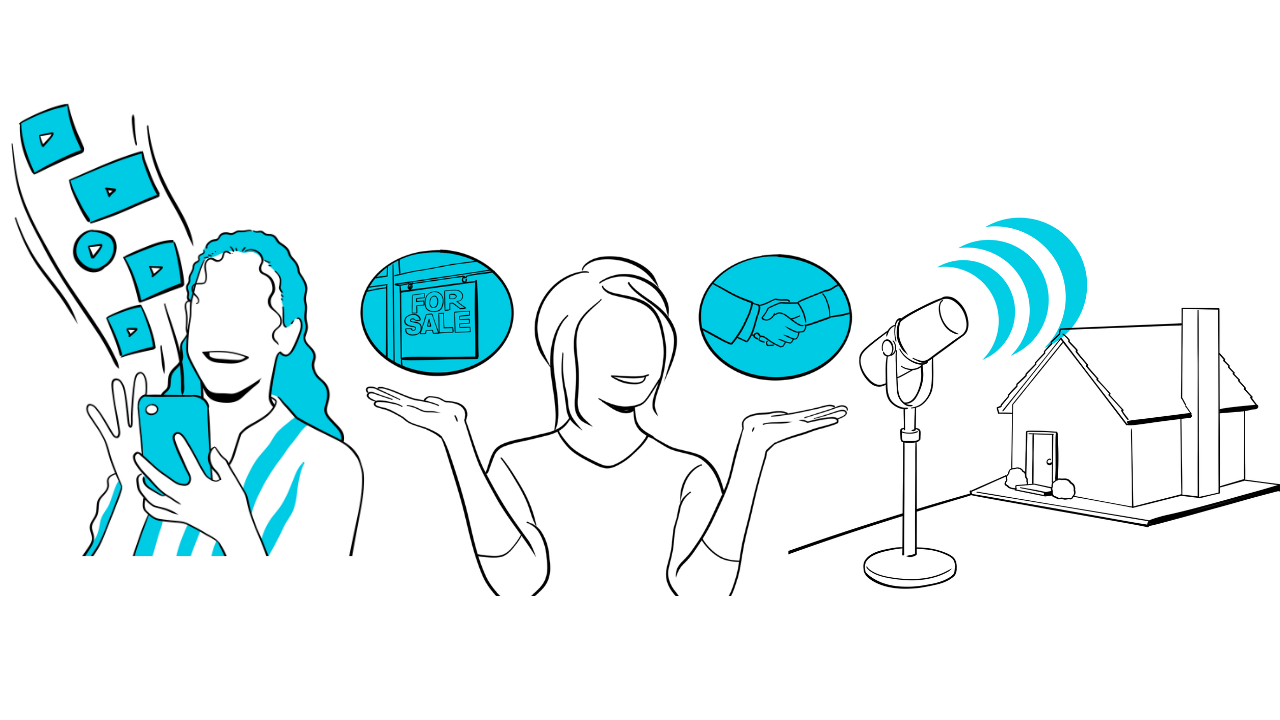A lot of people assume that shy agents can’t succeed in real estate. But there are plenty of introverted agents who have turned their shyness into their superpower.
Are you a shy person or an introvert? Would you like to know how to use that to your advantage? These tips will help you become a better salesperson.
Lesson #1: Focus on the Other Person to Break the Ice.
When we meet people in public, how can we start conversations and steer them toward our businesses? Even more importantly, how can we do that without sounding like a pitchy salesperson? We all hate being that person, and unfortunately, our reputation precedes us as real estate agents.
Most introverted people don’t like to draw attention to themselves and instead try to focus that attention on other people. You can use this to your advantage.
If you meet somebody new, follow your natural instincts. Try to make a habit of learning about that person. What do they do? Who are they, and what's going on in their lives? Figure out how you can provide value. See if you can offer suggestions or feedback.
Once you understand how you can help them and you’ve established a connection, work your business into the conversation. By putting potential clients first, you demonstrate that your interest goes beyond personal gain.
Lesson #2: Offer Help, Rather than a Pitch, When You Approach People Online.
Have you ever seen a post where someone asks for real estate advice, only to be bombarded by comments like, “I can sell your home!” “Message me!” “Email me!” “Call me!”
The likelihood of the poster actually reaching out to those self-serving agents is little to none.
A better approach in that situation is to provide value. If you can offer information and solve a dilemma, you can build trust.
Think about it this way:
If you were having car trouble and posted online for help, who would you be more likely to contact to solve your problem:
- The mechanic who simply answered, “Message me! I’ll check it out.”
- Or the mechanic who gave you specific details directly on the post about what could be wrong with your car and how it could be fixed.
The law of reciprocity kicks in when you give somebody something first; they feel obligated to give you something in return. So show up with information and value before you attempt to sell yourself.
Lesson #3: Gently Lead Prospects or Clients to the Sale.
The next step is mastering how to lead prospects down the right path without being pushy. For example, if you're on a listing presentation and the seller is trying to negotiate your commission, instead of getting defensive and aggressive, you could get them to empathize with you.
You could say:
“Mr. Seller, I completely respect and understand why you would ask that. Let's think about this for a second. If you were a real estate agent, and you were listing multiple homes, which of those homes would you be the most motivated to sell? Wouldn’t you be more likely to market the home owned by a seller who paid you a fair commission to work hard for everyone involved? The commission motivates the agent to sell the home quickly and efficiently. Investing in your agent guarantees you better results.”
Wait for the response and get them to come to their own conclusion. Obviously, how you word the question is going to make a difference, so make sure you practice and say something you can confidently stand behind.
If you're competing with an aggressive top producer for a listing, you could say something like this:
“Mr. Seller, would you rather work with a Realtor who is going to drop your listing price because they don’t have enough time to properly market your home? Or would you rather work with one who is going to put actual effort into marketing your home so it sells for top dollar?”
Now, let's say you’ve just listed a home and you're trying to convince the homeowner to stage it. Instead of telling them their place is cluttered and they need to put all their stuff in storage, get them to put themselves into the buyer's shoes:
“Mr. Seller, I want you to think about this for a minute. If you were a buyer and you looked at your home today — as well as all the other beautiful homes on the market — would you put an offer on your current home, or one that has been staged to show off its best features? Now, obviously we're not going to empty your home out, but what would you like to see? Do you have an easy time visualizing a home as yours when it has someone else's belongings in it?”
You could also say:
“I was showing a buyer some homes the other day. We were looking at 10 homes in one afternoon, and we walked through one that was staged. They absolutely loved it, and they could visualize their family living in it.”
Another thing introverted people are good at is listening. When you're talking to sellers or buyers, listen to their needs. What are they saying? Revisit their concerns when you offer your solution. When you’re working with a buyer, for example, and they're talking about all the different things they want in a dream home, don't speak over them; answer their questions. Listen to their concerns, then use those issues as talking points when you're showing a home.
“I know you were really concerned about having a playroom for your kids. This home would be perfect.”
Or
“I know you were concerned about a backyard for your dog. This home has a really nice fence. You won't have to build one. If you buy this home, you're going to save money.”
This is a consultant selling approach, and it’s a more effective way to build trust and rapport. You can get them to do most of the talking, and you'll make more sales.
Lesson #4: Make the Most of Silence.
The final tip is to use awkward silences to your advantage. For example, if you're sitting down over a listing presentation, you should assume you’re going to get the listing from the beginning. Once you get to the end of the presentation, you can start doing trial closes.
Say something like this:
“Mr. Seller, it's been great talking to you today. Let's go ahead and get your home sold based on everything we talked about. Do you agree to $1.5 million as the listing price?”
While you're saying that, pull out your listing agreement and fill in the spot where it talks about the listing price. They may be thinking in their head, “I haven't agreed to listing with this person!”
If they hesitate or meet you with an awkward silence, you can ask them about their objections and concerns. If you overcome those hesitations, they’ll run out of reasons not to list with you. The key is to constantly come back to the close and keep the contract out in front of them.
Lesson #5: Be Yourself.
Authenticity goes a long way in real estate (and in any sales profession). You don’t need to feign an overabundance of confidence or put on a fake persona to succeed. Most people will see right past it and be hesitant to trust you.
Stay true to who you are, deliver value, and be honest. Not only will you land more listings, but you’ll also build a solid referral business from clients who trust in you enough to recommend you to other people they know.
Bonus Tip: Get your own book.
Whether you are shy, a social butterfly, or somewhere in between, the real estate agent has never had a better friend than his or her own book.
You’ll be amazed when your shyness is no longer an obstacle to your goals, and you start booking more listings than ever because you're an author of a helpful book.
Remember that business you’re passionate about? Get yourself psyched about creating more momentum toward greater success!
Find out how you can get your own book here.



.png)




